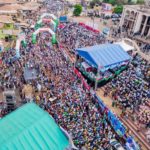Nigerian documentary filmmaker Joel Kachi Benson has revealed that when he first decided to pursue nonfiction storytelling, many of his friends were skeptical, even doubting his career choice.
Madu, a Disney Original Documentary, was honoured at the event held at the Palladium Times Square, also receiving a nomination for Outstanding Direction (Documentary).
“I remember when I first said I wanted to make documentaries, my friends thought I was half crazy. They were like, ‘What does that even mean?’ ‘What’s the model behind that?’ I couldn’t really explain it — I just knew I loved nonfiction, real stories, and unscripted TV. I love these real stories and I felt happy doing them. So I was like, Look, man, I’m just happy doing this. So I’m going to do it. And years later, we’re telling the kind of stories that we want to tell, how we want to tell them and putting them on these, you know, platforms,” Benson said.
Fast forward to 2025, Benson became the first Nigerian to win an Emmy Award for Outstanding Arts and Culture Documentary at the News and Documentary Emmy Awards in New York City. His winning film, Madu, co-directed with Oscar-nominated Matt Ogens, chronicles the journey of Nigerian ballet dancer Anthony Madu.
“I see myself in Anthony. Pursuing a dream that is seemingly unachievable, but you put your heart to it and, you know, let time and chance and all of that take care of the rest,” Benson said.
It won in its category, beating notable entries such as As We Speak: Rap Music on Trial and Butterfly in the Sky.
The film was inspired by a viral 44-second video of 11-year-old Anthony dancing barefoot in the rain in Lagos, which amassed over 16 million views online and secured him a scholarship at Elmhurst Ballet School in the UK.
Reflecting on his Emmy win, Benson said, “It wasn’t something I was expecting, because when they mentioned all the nominees, I was shocked. But I always see wins like this not just as personal victories but for the entire Nigerian documentary filmmaking community. It shows our stories matter. We can tell them on the biggest platforms and hold our own. I hope this inspires someone to say, ‘If Kachi can do it, then I can too.’”
Benson used the platform to call attention to the biggest challenge facing Nigerian documentary filmmakers: lack of funding and support.
“The biggest challenge for doc filmmakers in Nigeria is just access to support and funding to tell the kind of stories we want to tell,” he said. “That’s something I’m really committed to right now—whether it’s training or figuring out ways young filmmakers can access funds, no matter how little, to pursue their dreams.”
He emphasized that not every documentary requires a big budget and revealed ongoing talks with industry leaders like iREP founder Femi Odugbemi to make documentary filmmaking more accessible.
“It shouldn’t revolve around only a certain group who have access. The more filmmakers we empower, the better for the ecosystem — and the better for Nigeria. Who knows what the next guy could do to put us on the map?” he added.
Benson also announced that his latest documentary, Mothers of Chibok—a sequel to his Venice Lion-winning Daughters of Chibok—recently won three major awards at the Encounters South Africa International Film Festival, including Best Documentary, Best Feature Documentary, and the Al Jazeera Prize.
“It’s a validation of the work we’re doing and goes a long way in amplifying the voices of the women featured in the film. It’s been an amazing weekend — an Emmy and a continental prize. That’s great,” he said.











